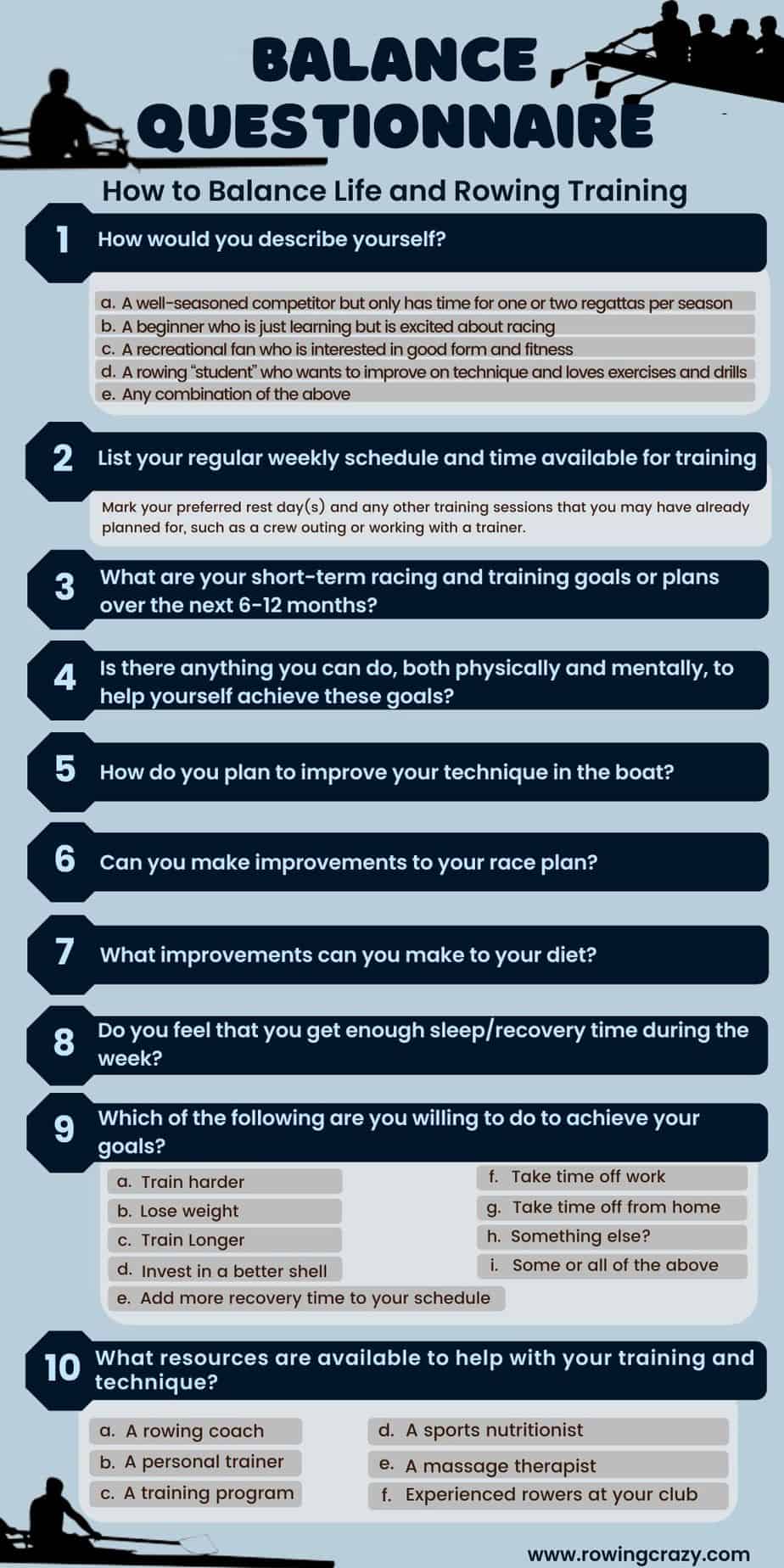
Hi friends! It’s your Masters coach Rebecca talking about balance. No, I don’t mean balance as in how to balance the shell, but how you can manage everything in your busy life.
It’s a rare person who is not busy. We’ve all got family, kids, grandkids, parents, jobs, housework, a social life, and then there’s rowing.
So, how can you balance your regular life duties with your rowing schedule? That’s our topic for today, so let’s get down to business!
You can dedicate the majority of your time to training and let your job and/or family suffer. Or you can give most of your energy to your job/family life and be disappointed with your time in your regattas.
Everyone has goals and needs that should be considered, which is why those one-size-fits-all workout plans just don’t work.
In today’s article, I’m going to help you figure this out with the help of a questionnaire. This tool will provide you with a framework so you can make better choices.
It’s All About Flexibility and Balance
If you’ve ever tried to do too much in one day and found yourself rushing through your training program, only to discover that you not only didn’t meet your goals but also weren’t happy with the experience, I feel your pain.

Rushed outings are not enjoyable. To get more of what you want, you need to determine what your personal goals and needs are.
Come to think of it, a retired 60-year-old grandmother who is watching her grandchildren full-time will have different needs and goals from a single 30-year-old male with a regular 9-5 job and no children.
Don’t let anyone tell you that you “should” do anything in a certain way. No one knows you and your life better than you do.
Your age, current fitness level, and whatever commitments you may have will impact both your training schedule and energy levels!
Every one of us only has so much energy each day, that’s why it makes sense to try to keep the scales even (at least as much as you possibly can). Only then will you get the most out of your life and enjoy some self-satisfaction at the same time.
- Read How to Keep Rowing Motivation while Traveling
Planning Is Important
There’s an old saying that goes, “A failure to plan is planning to fail.”

Here are my best suggestions for making a plan that will balance your home, work, job, school, and rowing:
- Pick a day (Sunday works for me, but it might be different for you) where you plan out your weekly schedule. Be sure to be a bit flexible and leave time for unexpected traffic, sick children, or a flat tire. You should also schedule downtime for yourself. Post your schedule where you (and other family members if you live with them) can see and understand your schedule. This way, if someone has something important (a school play or doctor’s appointment), you can rearrange your schedule.
- Try using a planning software program. Services like FitClub.me or Ludum.com help you log in your rowing time, plan regattas, etc.
- Create a bit of “space” in your schedule. For example, you might try getting off the bus about 20 minutes before your stop and walk the rest of the way to your destination. During this time, you can call business associates, family, and friends, or make appointments.
- Avoid sacrificing your personal time for anything other than a true emergency. You would never dream of telling your child that you’re too busy to take them to the emergency room for a broken arm, of course, but I’ve seen people sacrifice their personal downtime or even training time because someone else made them feel guilty. Your time is yours, and it is NOT selfish when you are taking care of yourself. Everyone needs a “mental health day” so don’t feel guilty if you don’t feel like rowing or going to work, and you take the day off to watch old soap operas or get a massage and eat ice cream.
- Find a support team if you can. Your family would be ideal, but sometimes, they just don’t understand your love of rowing. If you are in a crew, find like-minded, age-similar crew members who will be sympathetic and understanding to what you are going through. This may not help you manage your time better, but it will certainly feel like you are.
As for the scheduling part of this advice, I’m going to post a questionnaire that will help you get the most out of your training, while it contributes to your greater sense of well-being.
- Click Here to Read About Masters Coaching Rowing Issues
The Balance Questionnaire
Try to be as honest as you can with these questions. There are no right or wrong answers, and no one needs to see your answers, only you and whomever you wish to share your answers with.

After you answer these questions, you should have a framework that will help you create a more balanced schedule.
While making this schedule, include your priority days, flexible days, and recovery days. If your schedule needs to be re-arranged during a certain week, a flexible day can be used as an additional day off or a day for a workout that you may have missed earlier.
You don’t have to show your answers to anyone, but if you belong to a crew, you might want to talk about your answers with them and see what their answers are.
Perhaps by discussing the above questions, your group may want to invest in something that would benefit everyone, such as chipping in to hire a coach or purchasing a boat that everyone can use.
I have found that everything is easier if you have like-minded friends and supportive family.
- Do You Have Kids? See My Tips On Managing Your Rowing Training with a Family
No Time? Make Time!
As a young girl, I remember hearing people talk about “making time” for things that really mattered. Growing older, I couldn’t imagine how anyone could “make” time since it seemed to be in limited supply!

However, over the years, I’ve discovered exactly what they meant. They didn’t mean to literally build time, but to make the most out of the time you have.
For example: What would you be able to accomplish if you woke up just 30 minutes earlier? Or what if you added just 30 minutes of practice each day rather than sit in rush hour traffic?
Sometimes, it feels like there aren’t enough hours in the day, but I’ve found that this isn’t always true. We just need to prioritize our lives. This will create time for what really matters to you.
At the End of the Day
When you use the questions above, you will have a framework for what is possible as well as what is important.
This base plan may not solve all your issues, but I want you to look at what is essential in your life and what isn’t, then plan accordingly.
Everyone’s life is different, so don’t let anyone tell you that your 1-hour nap time shouldn’t be a priority!
Keep rowing and get a life, it doesn’t have to be one or the other!
Written by Rebecca Caroe – RowingCrazy.com
Experienced Rower, Rowing Podcaster, Olympic Rowing Commentator & Expert Masters Rowing Coach
Rebecca Caroe is a masters rowing expert and a rowing coach. She is a rowing entrepreneur, has commentated for the BBC at London 2012 Olympic Games and is also a very well known Podcaster in the rowing world.






Pingback:
Pingback:
Pingback: Rowing Machine Vs Weights: Which Is Best for Weight Loss?
Pingback: Managing Training When You Have Small Children |Rowing Crazy